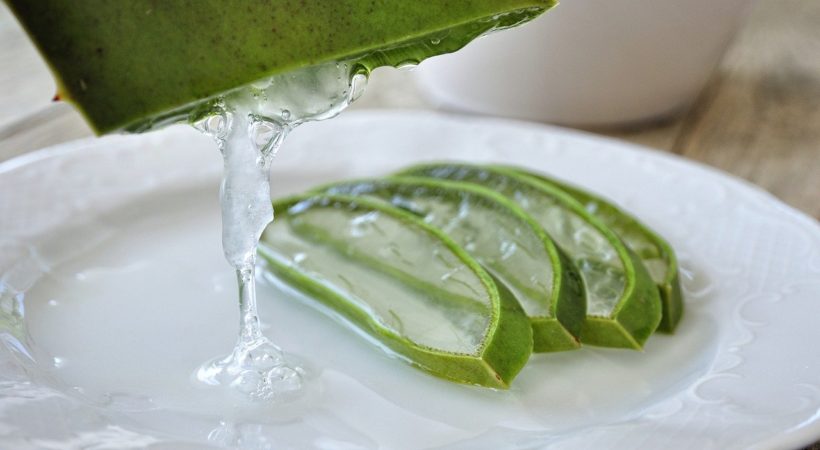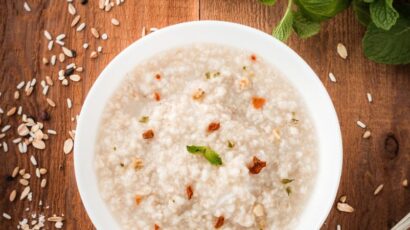Aloe Vera: Its healing properties and benefits

Aloe vera shots and facial mists may seem like all the rage these days, though these remedies are much more than another passing trend.
The aloe vera plant, also known as “the lily of the desert,” is a succulent. Aloe-based products and the plant itself is used to heal scrapes, cool sunburn, and relieve pain from minor cuts. Its uses go far beyond treating bug bites and boo-boos for kids—it has become a go-to for soothing digestive tracts and has become a key ingredient in beauty products and rituals. Aloe vera can be helpful for supporting thyroid and intestinal health, too.
Before starting any new skin-care regimen or taking aloe orally, talk to your doctor, as it’s still potent medicine (even if it comes from a plant).
Aloe vera juice vs. aloe vera gel
What’s the difference between the gel and the juice that come from the aloe vera plant? Both the gel and the juice are beneficial and may come from different parts of the plant, with each bringing its own individual uses and healing properties.
Aloe vera juice is produced either from the whole leaf or just the inner portion (the composition of juice should be specified on the label) and is consumed orally as a health tonic. This health tonic has immune-boosting and digestive-stimulating effects. The National Center for Complementary and Alternative Medicine reports that aloe vera juice is used to treat asthma, epilepsy, and osteoarthritis. The skin of the aloe leaf outputs a bitter liquid that is a potent laxative, which is why many prefer to seek aloe vera juice that originates from the inner fillet only, to avoid the laxative effect. Talk to your doctor before taking aloe, especially if you use it as a laxative—it could lower blood glucose levels and reduce the effectiveness of medication when taken orally.
A clear gel can be found inside the leaves, which is often used topically. The gel is a skin-soothing salve for sunburns and is a classic remedy for minor cuts and burns. The University of Maryland Medical Center, or UMMC, reports that glycoproteins and polysaccharides in aloe vera gel, among other vitamins and minerals, are responsible for its healing power
Aloe vera is a true medicinal plant. Inside the stiff and prickly stalks is the good, healing stuff: a clear jelly that feels fresh to the touch. The thick, green outer must be filleted off in order to consume this potent medicinal food, with the soft gel being highly concentrated with long-chain sugars—the same polysaccharides mentioned above—and glycoproteins that may provide satiation, long-term energy production, anti-inflammatory properties, and immune-enhancing qualities.
What to look for when buying aloe vera
When buying aloe vera, know that the best source is straight from the plant! If you don’t have an aloe plant at home yet, you can likely find aloe leaves or even full-grown plants at your local organic grocery, plant nursery, or farmers markets—but, buyer, please beware! It is only the aloe barbadensis variety that is nontoxic and safe to use internally, and where you get it matters. Look for an organic plant grown free of pesticides. Alternatively, pick up a clean, upstanding brand
Aloe vera and immunity.
The long-chain polysaccharide sugars in aloe are a healing form of sugar. The white blood cells that make up our immune system operate more efficiently on certain types of nutrients such as these bitter-tasting polysaccharide sugars. These rare sugars are the same ones you may have heard about in medicinal mushrooms such as reishi and chaga—they help our immunity and fight back all forms of infection. This is further boosted by glutathione inherently present in aloe.
Glutathione is a powerful antioxidant important for keeping energy levels high. It plays a key role in the development of white blood cells as well as preventing damage to other cellular functions as oxidation occurs. Many body functions can be boosted by the increased production of glutathione, including immunity, recovery time, detoxification, as well as metabolism!
Aloe vera for beauty and skin care
For clear skin, adding products containing aloe vera or aloe vera juice may help reduce redness and help broken skin and acne heal. As such, aloe vera is a powerful ingredient in toners and hydrosols, providing antioxidants, increasing hydration, and helping to reduce redness and the inflammatory response.
Keeping aloe vera juice or aloe vera gel on hand can also be good for a number of beauty and health needs. Try using it for makeup primer (apply before foundation), makeup remover, sunburn soother, facial mask, lightweight moisturizer, and treatment for an irritated scalp (mix in a few drops of peppermint oil and a carrier oil if your skin is sensitive).
Aloe vera and digestion
Internally, aloe vera can balance high blood sugar, regulate a leaky gut, and ease constipation. For this reason, we should consider it as seriously as we would a conventional medicine—it really is that much of a wonder and affects the system too. Aside from these incredible healing properties, it’s also a perfect component in a summer drink for quenching, cooling, and soothing.
Aloe also may have the ability to help with leaky gut. In animal studies, scientists have found that aloe can reduce markers of inflammation in the colon, and while further research is needed, it demonstrates that it does, in fact, have anti-inflammatory properties.
Aloe is also known as an effective diuretic. In traditional Chinese herbal medicine, rooted in ancient knowledge that’s thousands of years old, aloe has historically been used to address constipation and even parasitic infections. Ever wonder how it works? Researchers at Beijing University of Chinese Medicine have found that the purging nature of aloe is actually a result of our gut bacteria metabolizing the plant compounds found specifically in aloe vera. The end result of that is what helps move congested bowels along. According to Chinese herbal medicine, aloe has a cold and bitter nature, allowing it to drain “fiery” ails like irritability, restlessness, insomnia, red eyes, and headache, or dizziness.
Aloe vera and blood sugar regulation
Aloe is made of a constitution that has been shown to have positive effects on blood sugar back regulation, which is a major marker for happy, humming hormones. When blood sugar regulation is out of whack, it can lead to type 2 diabetes, which is often marked by inflammation, obesity, and insulin resistance. Insulin is a hormone that allows sugar molecules to enter our cells, which they then use for fuel. When cells are insulin-resistant, it means they no longer respond to insulin. Eventually, the cells can’t properly extract their energy from glucose if they are insulin-reesistant. In order to function properly, cells need to be efficient at utilizing glucose. Plus, when insensitive, the blood is left full of excess insulin and glucose swimming around causing a chain reaction of problems. Research has found that our friend, the aloe plant, in addition to taking preventive lifestyle modifications to balance blood sugar, helps to manage insulin sensitivity and keep our cells attuned to its activity.
According to Akira Yagi, professor at Fukuyama University, extracts of aloe may even improve signs of Alzheimer’s disease and some forms of dementia, when the brain has become insulin-resistant. Source:mindbodygreen















